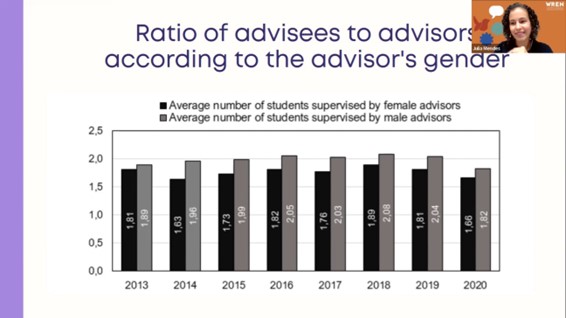Hierarchical Segregation in Teaching and Research
In November 2022, WREN held the forum “Hierarchical Segregation in teaching and research: how to solve the gender gaps in STEM?”. In this forum, panelists discussed the evidence and reasons for why the greater the power and prestige of a job in STEM, the lower the presence of women in it is.
Opening the event, Prof. Julia Mendes presented her and her team from UFOP and UFJF’s evaluation of the graduate programs of Civil, Environmental and Transport Engineering in Brazil, investigating the advisor-advisee relationships by gender and analyzing the current scientific production of professors and students. Their findings were alarming:
- Only 28% of professors in these graduate programs were female, even though women represent 47% among master’s degree recipients and 42% among PhD receivers (2013-2020).
- Men advises 13% more students than women, on average. The gender differences grow as one advances in academic careers – female professors supervise fewer master’s theses and even fewer PhD dissertations in comparison with their male counterparts.
- Regarding publication metrics, female academics publish fewer articles, regardless of the impact factor, and supervise fewer students than male ones. These differences were more correlated to the academic’s own gender than to their advisor’s gender, meaning that academics supervised by women are just as productive as those supervised by men.

Our second guest was Brazilian researcher Camila Infanger Almeida, PhD Student in Political Science at the University of São Paulo and a specialist in gender studies. She introduced the Brazilian movement “Parent in Science”, which urges to secure better opportunities for moms in the academic field. “The tenure and the biological clocks run at the same time,” Camila said, meaning that the age when women are most productive in science is also the critical period when women must decide on their family plans. Camila showed us how motherhood is neglected in the traditional “metrics-only” assessment of grants and graduate programs, and how this chronic indifference affects women’s progress in their careers.
Last, Prof. Shamika Almeida, Associate Dean (Equity, Diversity and Inclusion) in the faculty of Business and Law at the University of Wollongong, Australia, inspired us with her life story. “As a person of color and first-generation migrant, very rarely do I see people who are like me in senior leadership, so I want to change that [scenario],” she said. Prof. Shamika also presented important reflections about menopause and caretaking; how minorities are rarely seen in the “popular groups” (which impacts their ability to network); the importance of having a “diversity statement” in funding applications so that mothers and minorities can have effective chances of winning; how mentoring for women, especially in their early careers, is critical for balancing the scales in research, and much more.

Another important takeaway from the event is that policies for gender equality that are implemented on an individual scale (only in certain universities or graduate programs) have a limited impact. The efforts must start at the top of the command chain if they are to be effective. At the same time, as Prof. Shamika noted, the best ideas often come from the bottom of the chain, so it’s crucial for policymakers to hear those who are more affected. Finally, for an effective change in the current scenario, men must support women and other minorities (because they are already at the top positions, making the rules).
WREN thanks Prof. Julia Mendes, Prof. Shamika Almeida, and researcher Camila Infanger for their insightful talks. We also thank all the attendees for sharing their experiences.
For more amazing discussions, follow the link to our YouTube Channel: www.youtube.com/@thewrenglobal
